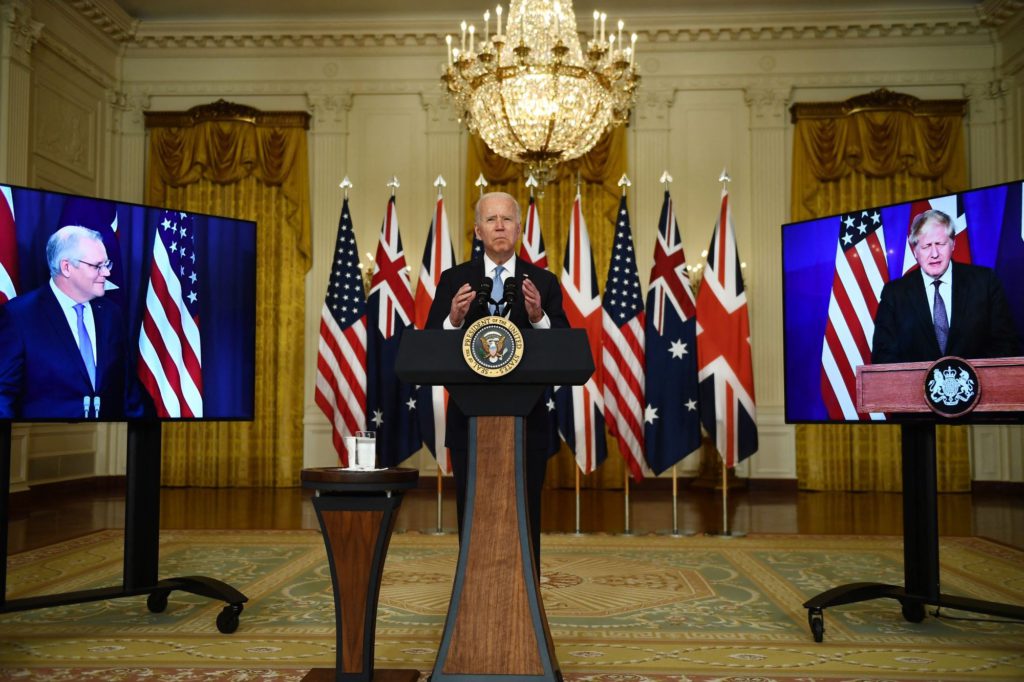(Bloomberg) — The U.K., U.S. and Australia said they are working on developing hypersonic weapons — military technology already deployed by Russia in Ukraine — as part of their new trilateral security pact called AUKUS.
Their plan is to “accelerate development of advanced hypersonic and counter-hypersonic capabilities,” according to a joint statement. The alliance wants to counter the threat of such weapons, which can evade traditional missile defense systems and travel five times faster than the speed of sound, and develop its own as a deterrent, a U.K. official said on condition of anonymity.
Read More: Russia Uses Hypersonic Weapons as War Enters Bloodier Phase (1)
Russia’s invasion of Ukraine has pushed Western governments to reassess their military capabilities. The AUKUS leaders — Australia’s prime minister Scott Morrison, U.S. President Joe Biden and British premier Boris Johnson — said in a joint statement Tuesday that they are also deepening defense cooperation on issues such as electronic warfare, where adversaries seek to use the electromagnetic spectrum to gain an advantage on the battlefield.
“In light of Russia’s unprovoked, unjustified, and unlawful invasion of Ukraine, we reiterated our unwavering commitment to an international system that respects human rights, the rule of law, and the peaceful resolution of disputes free from coercion,” they said in the statement. The AUKUS alliance is also working collectively on areas like cyber warfare and artificial intelligence.
Australia is also one of the countries on the front line of rising competition between the U.S. and China, with relations between Canberra and Beijing rapidly deteriorating in recent years. The Australian government has denounced allegations of human rights abuses in China and called for an independent investigation into the origins of Covid-19, which resulted in Australian exports facing obstacles entering Chinese ports.
Chinese Foreign Ministry spokesman Zhao Lijian was critical of the latest plan by AUKUS, saying Wednesday at a regular press briefing in Beijing that it would “escalate the arms race in Asia-Pacific, and undermine peace and stability in the region,” while also dismissing the grouping itself.
“It follows the old logic of Cold War mentality, bloc politics, and the old trick of seeking military confrontation and adding fuel to the fire with the ultimate goal of building a Nato-like bloc in the Asia-Pacific region,” he said.
Explainer: Hypersonic Weapons — Who Has Them and Why It Matters
The AUKUS pact announced in September last year was designed to help Australia develop at least eight nuclear-powered submarines, a project that could take more than a decade, and also coordinate military capabilities to promote security in the Indo-Pacific region. Biden, Morrison and Johnson said they are “pleased” with the progress on delivering the submarines and that they remain committed to a “free and open” Indo-Pacific.
The Australian government, which is expected to hold an election in May, has been playing up its national security credentials ahead of the vote. On Tuesday, Australia announced A$3.5 billion ($2.7 billion) to accelerate the acquisition of improved weaponry for the Australian Defense Force, including missiles and maritime mines.
“We want to make sure that our country has the capability to deter any act of aggression against our country, but it’s a very real and serious situation. We need to be realistic about what is going on to happen over the next few years or the next decade,” said Australian Defense Minister Peter Dutton on Tuesday.
(Updates with comments from China’s Foreign Ministry.)
More stories like this are available on bloomberg.com
©2022 Bloomberg L.P.











